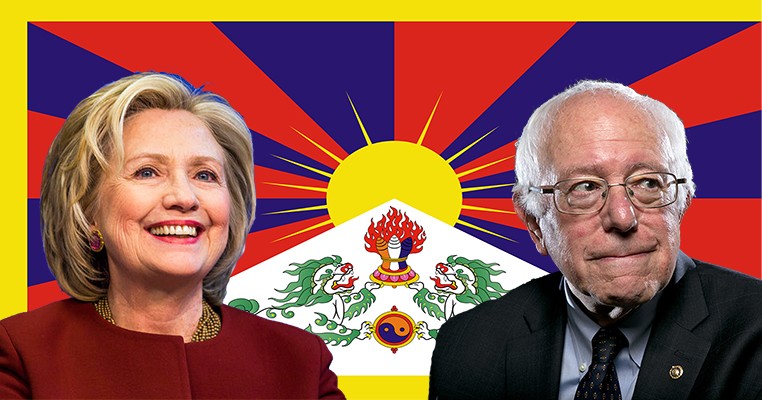
by Ryan Charles
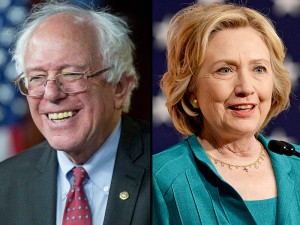
Bernie Sanders and Hilary Clinton
The 2016 Presidential race is firmly upon us and with the third Super Tuesday this past week former secretary of state Hilary Clinton widened her delegate lead on the underdog Senator from Vermont, Bernie Sanders. As voters continue to go to the polls in the primaries and eventually in November to vote for the President they are presented with where the various candidates stand on a multitude of issues. While their views on things like economic equality and gun control have been at the forefront of media coverage one issue that has yet to see major coverage is that of human rights, including in regards to China and Tibet– an important issue to Buddhists and followers of His Holiness the Dalai Lama.
Let’s take a look at where the two major democratic candidates stand in regards to this…
Hilary Clinton:
No stranger to International affairs Hillary Clinton served as secretary of state from 2009 to 2013. Her history with the Dalai Lama and Tibet goes back much further though. In 1995, at the World Conference on Women in Beijing, China, Clinton expressed her disapproval at Chinese restrictions placed on exiled Tibetans wishing to participate in the conference. In 1997, while serving as first lady of the nation Clinton pressed then Chinese President Jiang Zemin on the Tibet issue- specifically the repression of their religion. In her 2003 memoir, Living History, Clinton describes an encounter with Zemin at the White House where Zemin: “became passionate, even banging the table once. ‘They were victims of religion. They are now freed from feudalism.’ The Chinese, for historical and psychological reasons, were obsessed with avoiding internal disintegration. In the case of Tibet, that led to overreaction and oppression.”
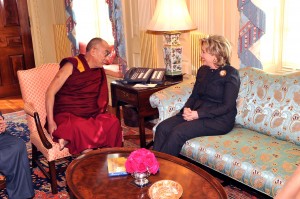
Clinton meeting with the Dalai Lama in 2010
In 2008 Hilary Clinton called on then president George Bush to boycott the opening ceremonies at the Beijing Olympics and after becoming secretary of state in 2009 Clinton visited China yet again seeking to foster policies that would improve human rights in Tibet and to ensure religious freedom there “without fear of being prosecuted”. Then in 2010, despite China’s objections, she met with the Dalai Lama. Said Clinton: “We urge China to protect the rights of minorities in Tibet; the rights of all people to express themselves and worship freely; and the rights of civil society and religious organizations to advocate their positions within a framework of the rule of law.”
Clinton has sponsored several bills supporting the rights of Tibetans and in 2012, not long after two envoys of the Dalai Lama to China resigned over “utter frustration” Clinton reportedly urged Chinese Foreign Minister Yang Jiechi to engage in conversation with His Holiness in hopes of bringing about a reconciliation of the Chinese/Tibet issue.
Bernie Sanders:
While Hilary Clinton is certainly a friend of the Dalai Lama and sympathetic to the plight of Tibetans she is also a pragmatist who recognizes the necessity for compromise. In 2009, visiting China for the first time since becoming secretary of state Clinton said, “I hope human rights and the issues of Taiwan and Tibet will not hinder us to resolve other issues.” Bernie Sanders, known for his idealistic stances on issues has also repeatedly supported bills that condemn human rights abuses by the Chinese government in Tibet- like a bill in 2008 that called for “a dialogue between the government of China and His Holiness the Dalai Lama” and “the right of the people of Tibet to speak of the Dalai Lama and possess his photograph” among other things.
Sanders has urged that an agreement permitting China to open further diplomatic missions in the U.S. should depend on the establishment of a U.S. government office in Lhasa, Tibet.
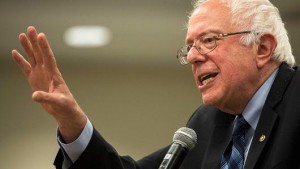 In a stirring speech on the Senate floor in 1999 Senator Sanders described his meeting with the mother of one Ngawang Choephel, a Tibetan born, former Fulbright scholar who had been studying international music and filmmaking at Middlebury College in Vermont who was arrested while filming a documentary in Tibet in 1995. Charged with “espionage and counter-revolutionary activities” he was sentenced to 18 years in jail without a trial, no evidence of his guilt having been produced. Finally freed in 2002, Choephel wrote in January 2016: “Bernie Sanders will not only make America greater and end its ‘Coin Flip Democracy’, but he will care more about voiceless people around the world. He was one of the key people who helped secure my release from Chinese prison in 2002. Both my mother and I had the privilege to meet him. He was as genuine as we see him today. Unlike Hilary Clinton, he is not fighting from entitlement. He is fighting for all of us, and for the world as a whole. I urge all my friends in the US to vote for him, especially those from New Hampshire. I believe this is one of America’s greatest tests of freedom yet to come.”
In a stirring speech on the Senate floor in 1999 Senator Sanders described his meeting with the mother of one Ngawang Choephel, a Tibetan born, former Fulbright scholar who had been studying international music and filmmaking at Middlebury College in Vermont who was arrested while filming a documentary in Tibet in 1995. Charged with “espionage and counter-revolutionary activities” he was sentenced to 18 years in jail without a trial, no evidence of his guilt having been produced. Finally freed in 2002, Choephel wrote in January 2016: “Bernie Sanders will not only make America greater and end its ‘Coin Flip Democracy’, but he will care more about voiceless people around the world. He was one of the key people who helped secure my release from Chinese prison in 2002. Both my mother and I had the privilege to meet him. He was as genuine as we see him today. Unlike Hilary Clinton, he is not fighting from entitlement. He is fighting for all of us, and for the world as a whole. I urge all my friends in the US to vote for him, especially those from New Hampshire. I believe this is one of America’s greatest tests of freedom yet to come.”
So while there are similarities and differences in the two democratic candidates’ approach to human rights in regards to Tibet it is clear that both Clinton and Sanders are friends of His Holiness and supporters of Tibet in terms of policy. Sanders’ idealistic fervor could be seen as a slight perk to staunch supporters of human rights- not only in China and Tibet but around the world- but Hilary Clinton has worked in her career as a politician to ensure religious and political freedom for people around the world as well.

Sign up for our Wakan Films email newsletter and receive the very first and latest news from Director Khashyar Darvich and Wakan Films about the release of our new inspiring films, and where they are screening near you.
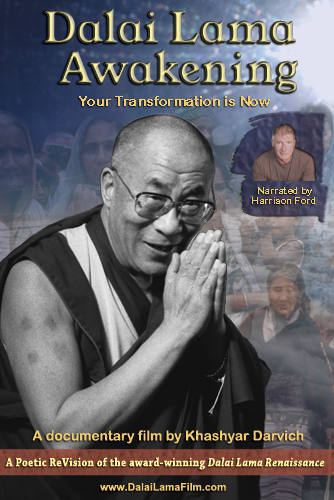
Sign up for our Wakan Films email newsletter and receive the latest news from Director Khashyar Darvich and Wakan Films about the release of our new inspiring films, and where they are screening near you.